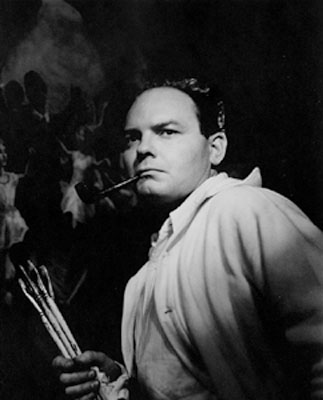Curry and Wisconsin Progressivism
Curry was the Artist-in-Residence from 1936-1946. Curry came during the age of the “Wisconsin Idea”; a broad initiative to foster the economic, social, intellectual, and moral development of the people of the state. The Progressive notion was: “the boundaries of the campus are the boundaries of the state.” (Junker 184)
The university’s rural art program, by the mid-1950s, had grown from an idea into a statewide organization drawn from regional and local associations and related regional exhibitions, classes, and workshops. The university was also a complex world of groundbreaking discovery. College of Agriculture scientists were engaged in some of the major vitamin discoveries of the early 20th Century. (Junker 184)
The Wisconsin Progressive Party began in 1934, when it separated from the Republican Party. However, Progressive ideas culminated around 1900, by reformer Robert M. La Follette, Senior. La Follette was the governor of Wisconsin (1855-1925) and made Wisconsin the model state for progressive ideas. This resulted in the passage of bills such as a corrupt practices act, a worker’s compensation act, and the first state income tax. Another success of the movement was the Secret Ballot, which was adopted in Wisconsin and the direct primary elections in 1903. The state became a leader in social legislation. (Britannica)
Wisconsinites responded to the rapid changes in population, technology, work, and society with action: they advocated women’s suffrage, labor rights and protections, educational reform, increased social services, and an overall more responsive government. (www.wisc.edu/wisconsinpress/books/0215.htm)
The formal definition of Progressivism is as follows: “implies a philosophy which welcomes innovations and reforms in the political, economic and social order, usually to alleviate the ills of society, to assure people a broader control of their governments and to afford greater economic, political, and social justice to the people.” (www.libarts.sfasu.edu/history/134_Unit6A.html)
Progressivism may very well have been the response of various groups to problems raised by the rapid industrialization and urbanization that followed the Civil War. Many Americans feared that their historic traditions of responsible democratic government and free economic opportunity for all were being destroyed by gigantic combinations of economic and political power. (Britannica)
